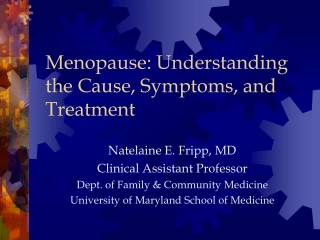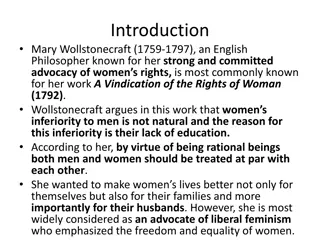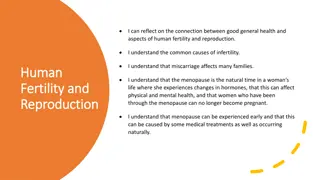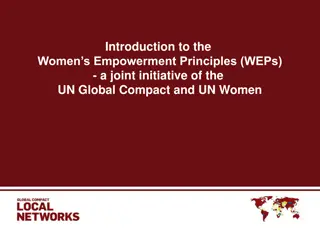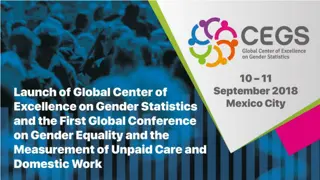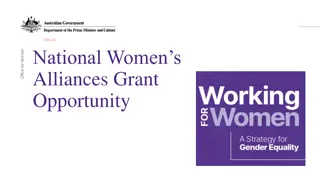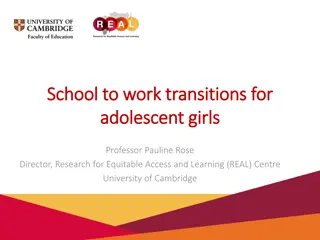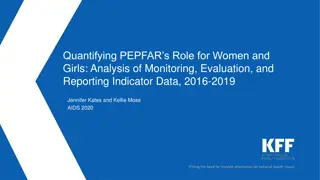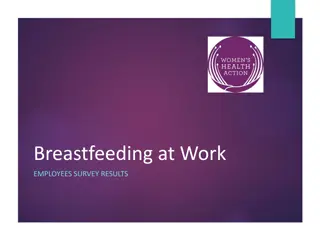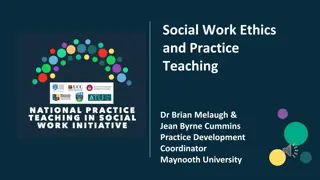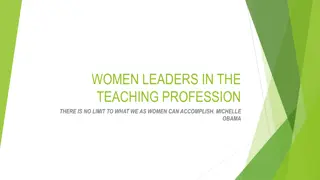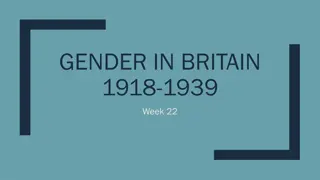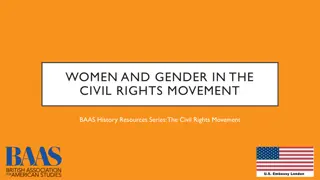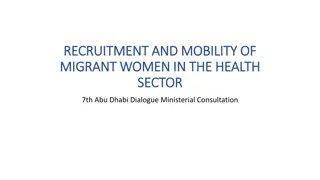Menopause at Work: Challenges and Impact on Professional Women
The discussion revolves around the experiences professional women face with menopause at work. Different women have varying experiences, from liberating feelings to noticeable symptoms impacting work performance. Organizations are beginning to introduce menopause policies to support their employees. Menopausal symptoms can affect work productivity, with night sweats and hot flushes reported as most disruptive. While symptoms may lead to time off work and decreased concentration, micro-accommodations can help mitigate the impact.
Download Presentation

Please find below an Image/Link to download the presentation.
The content on the website is provided AS IS for your information and personal use only. It may not be sold, licensed, or shared on other websites without obtaining consent from the author. Download presentation by click this link. If you encounter any issues during the download, it is possible that the publisher has removed the file from their server.
E N D
Presentation Transcript
Menopause at Work: What do we know? Professor Kathleen Riach University of Glasgow UK www.menopauseatwork.org
Different Women, Different Experiences In a professional context, I didn t want to get to the point where I was bringing two changes of clothes, because I was getting not too far off that. For long days, I was deliberately choosing a cardigan for the day so the jacket would not be smelly for the evening, that s unpleasant but I ve got that back under control now, but, those are things smelly is probably the thing that worries me most followed by unanticipated bleeding and the sort of heavy flows where it cannot be contained (Hannah) Menopause? No drama, no issues, nothing, perhaps too simple everything, yeah it was really nothing, I didn t even have to go to the doctor to consult with the doctor [ ] Absolutely no implications for me, nothing, it was like busy, breezed through (Valerie) What does menopause mean to me? Well it feels really liberating, the last few years of having a period I just got really annoyed. I m annoyed at the expense of buying products, I was annoyed at the inconvenience (Diana) I had cancer in my late 40s and tamoxifen jettisoned me into early menopause. Symptoms at that time were noticeable but not for an extended period. This never affected me at work (Alana)
The landscape of menopause and work Demographic Political Legal Organisational Personal
Organizational Landscape Many high-profile organizations beginning to introduce menopause policies A range of professional guidance ACAS (October 2019) CIPD (March 2019) EMAS (May 2021) MIPO (January 2019) Menstrual and Menopause Leave in addition to sick leave? Role of supporting SME S and subcontractors still in its infancy
Symptoms can affect work 40% reported that symptoms have a negative impact on work, and 12% took time off due to symptoms Poor concentration, tiredness, poor memory, feeling low/depressed, lowered confidence For professional women, night sweats (reported by 74%) and hot flushes (80%) were the most bothersome and disruptive to their working lives Estimated costs of presenteeism and work activity impairment related to VMS (vasomotor symptoms) increase from US$1,100 (per woman, mild symptoms) to US$6,500 (per woman, severe symptoms) HOWEVER: Symptom frequency and bothersomeness mainly related to work outcomes Micro-accommodations have a significant offsetting impact
And work can affect symptoms physical and environmental factors Physical and Environmental Factors Psychological Factors Organisational cultural factors
Embedded Enabled Acknowledged Accepted
Embedded: Integrated into practice Even if your workplace doesn t have a policy, other policies can be utilised Flexible working Diversity and inclusion policies These policies are clear on alignment with strategic objectives of organisation so do not feel you are being a problem (you are an asset!) When working practices change, the implications and consequences for those with significant menopausal symptoms is a legitimate aspect to consider
Enabled: Who does the labour? Leaders, HR, Line managers, all colleagues Informal networks and support groups valuable source of expertise Discussions surrounding menopausal support should be separate from performance management Do not feel that you should take on additional labour to be a champion Expect to be surprised about where and who your allies might be
Acknowledged: Part of a broader talent pool Targeted consideration of women s capacities and skills: Gendered Ageism Second Horizons leadership potential Viewing menopause as part of a full and rich work trajectory Should be part of a broader awareness of: Later life working Women s bodies at work (endo*, menstruation) *Endo, or endometriosis is when tissue similar to that from inside the womb grows in other parts of the bodies, causing intense pain, It affects 1 in 10 women in the UK.
Accepted: Practical solutions Avoiding red tape to access resources What micro-accommodations/inclusivity signals are possible to locally put in place? Advanced notification of meeting or working places and timings Staggered/broken up lunch hours (i.e., 2 x 30 minutes) Changing the place you work to help temperature control Not assuming working from home is the best solution Other workplace considerations can include Multilayered or natural fibre uniforms Toilet and rest facilities Education and awareness Line managers are key!!!
What can your next steps be? If you are affected Know that your employer has a legal duty to provide safe working conditions for you What support is available? What do you need? Have an idea of what you would like actioned before disclosing Reflect on how it is impacting your work (think about frequency and severity) Who do you speak to? You can choose to speak to either your direct line manager/supervisor or HR Think of ways that impact might be offset through micro-accommodations Recognise that you are valuable as a member of staff, both as an individual and as part of a cohort of working women
Questions, comments and further correspondence welcome kathleen.riach@glasgow.ac.uk www.menopauseatwork.org


